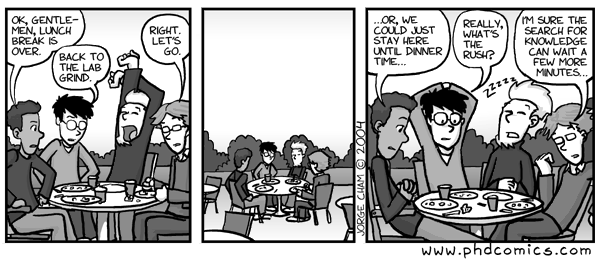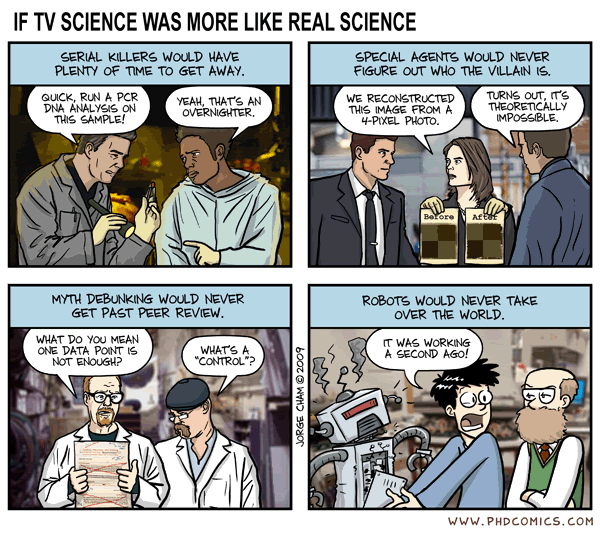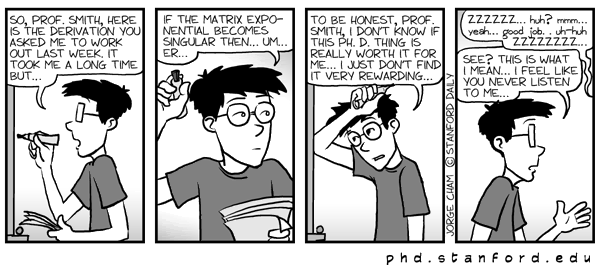'What's on your mind?' These are the four words taunting me on my Facebook page as I wind down from a long day at work. Today that may be a tough one to answer in a witty one-liner. The postdoc union this week reached a tentative agreement with the University of California to help implement a whole host of improvements to postdoc working conditions, and I was obliged to vote for or against its ratification.
Negotiations have been ongoing over the past two years since I arrived at the University and over the course of that time I've heard numerous arguments on both sides. Things came to a head recently, after much feet dragging by the University, with an interesting piece in the Daily Californian by a somewhat rare supportive faculty member (http://www.dailycal.org/article/109883/postdocs_deserve_good-faith_contract). A key aspect to the contract is better wages, in line with the National Institute of Health's recommended scale for postdocs. This, along with a rather ironic advert I came across on a webpage the other day, inspired me to write a piece about why scientists, particularly postdocs, get paid so little.
Are scientists the poor struggling artists of our time?
Well, maybe it's not quite as dire as that, but one thing that my husband and I have to admit to ourselves these days, and it seems we are not alone, is that this profession we have chosen is preventing us from starting a family. What's more, when we meet up with non-scientist friends, it is becoming increasingly clear that our lifestyle is quite different and our combined salaries don’t match even one of theirs.
So, back to this aforementioned advert that prompted my soul searching: "Do you make less than $54K?" it exclaimed. "You could be eligible for government assistance to go back to school". I nearly choked on my bitterness! Precisely what would they suggest that I go back to school to do? Another PhD? Now, I can just hear the condescending scoff from many a fellow scientist, wondering precisely what I was expecting. If I don't like it I should just get out, right?
Don't get me wrong, I did a PhD and stayed on in academia knowing full well what to expect, and the martyr tucked away inside tells me to shut up and just get on with it, I should just thank my lucky stars that I even have a job in the 'current economic climate' (three words that instil fear in me!). What's more, there are things about academia that are really fantastic, and that you wouldn't get in any other job, that keep me somewhat hooked.
Part of the reason I did a postdoc after my PhD was the opportunity to live in California for a couple of years, you really can't complain about all this sunshine, even if you're British and a culture of complaint is etched into your bones! But just because a poor wage is something we've come to expect as scientists, doesn't necessarily make it right, right?

There is, in fact, the potential to earn a decent amount of money in academia, maybe not as much as you might earn in other professions, but a healthy 'love of science' and some of the other perks of academia (essentially working your own hours and guiding your own work) mostly outweigh that. But that requires pursuing the academic career path and securing a tenure track position. Something that, these days, is easier said than done. The crux of the problem is job security; there are an increasing number of newly trained PhD students entering a much tighter job market.
PhDs used to enjoy the lowest unemployment of any professional group and the postdoc period of a career was much shorter, with a more rapid progression to tenure track positions. Nowadays it is not uncommon to find PhD graduates in postdoc positions for 5-10 years. A rather shocking statistic suggests that after 5 years, only about 20% of PhD graduates hold tenure track positions. Those who wish to pursue higher education to help them stand out from the crowd seem to be getting chased further and further down the garden path. Previously, an undergraduate degree was sufficient to get you a good job, as time went on a graduate degree has become the new sought after qualification. I can't count how many times I was told, "You can do anything you want with a PhD; the World is your oyster".
That's not to say that I don't believe that still, and in fact that is sort of the point (and I'll come back to this later on), that even though tenure track positions may be drying up, there is still a wealth of opportunities for grad students.
Why have things gotten so bad? An excellent article in The Scientist probes further into this problem (http://www.the-scientist.com/article/home/24540/). In this article, the author speculates that many faculty members, dependent on the 'cheap labour' of postdocs and grad students, may be in denial of the problem, though this may be a disservice to many excellent principle investigators (PIs; the lab boss) who go above and beyond the call of duty in cultivating the careers of the members of their lab. My own PI believes the situation, at least in the U.S., may actually be set to deteriorate. With many labs taking up the NIH stimulus funds that will all run out at exactly the same point, the competition will be increasingly fierce for available research grants and larger labs may be forced to slim down. But there may be some truth in the denial of the problem, not just for senior faculty members but for everyone, including newly enrolling graduate students.
In an article in the April 9 edition of the Chronicle of Higher Education this year, David D. Perlmutter, professor at the University of Iowa, asked the question "Were tenured professors to blame for your career prospects?" Here he suggests that many of the advisors we rely upon to guide us through our graduate careers are out of touch with the current job market, often not having had to persuade anyone to hire them in decades. He says the failure rests not with any ill intent or desire for slave labour, but with avoiding acknowledgment that the academic dream is dying. It is difficult to deter a graduate student from the career path they themselves pursued and often cherish.

But I think it is more than just denial. I mentioned this idea of my own martyrdom being partially responsible for keeping me on the academic track. The real question for me is why is it still seen as a 'failure' to pursue alternative, non-academic careers? In my own experience it is incredibly difficult to talk to your academic advisors about anything other than an academic career. In light of all of the current problems, however, it would seem as though the majority of PhDs are set up for 'failure' from the beginning if we all stay on the academic path.
Speaking with other graduate students and those involved in promoting alternative careers, it seems that the reason for this is likely that academics are so invested in the career path they are trying to promote. Coming back to acknowledging the death of the academic dream, many academics are unwilling to admit to themselves that the career path they have hiked so far along, and have been hoping to lead you down, might not be so amazing after all. It's easier to call your bluff and make you feel like a failure than to admit that there are excellent alternatives. It's sort of like a parent who always hoped their child would follow them into the family business, even though the business is struggling.
It seems that we need a complete rethink of the post-PhD career path. Many universities are already starting to understand this and encouraging graduate students to think about alternative careers and teaching them to value the 'transferable' skills earned through grad school as well as the scientific knowledge and experience. My personal experience with my postgraduate studies in the UK and my postdoctoral experience in the US have been excellent. Both Universities encouraged development and understanding of the skills gained through higher education. However, although many universities are coming around, most senior academics are not.
During my PhD there was a real sense from those running the research labs we worked in that the skills workshops we were required to take were a complete waste of time, and took us away from our important work unnecessarily. This is another part of the problem, I feel, many academics are unwilling to see the benefits of these kinds of programs, they didn't receive any thing like this themselves. We should also remember that PIs aren't our own personal careers advisors, they chose a particular career path and aren't necessarily aware of all the other options out there. But a little encouragement at least would go a long way. PIs should be pushed to undertake their own skills development training, to teach them about the current problem and show them what alternatives are available, perhaps that would steer us away from this culture of 'failure'.
Another potential reason I've seen suggested for the academic bottleneck is a lack of funding due to a decrease in public support of science and a failure to educate the public on science. In fact a whole movement began on this very premise. Although I agree there is a real need for improved communication of science to the public, talking with my science-writing mentor on the subject convinced me that the idea that this is the reason for decline in funding and available jobs is a fallacy. In some respects the 'poorly educated public' have become a scapegoat in this argument. Non-scientists often understand science a lot better than we give them credit for. What's more, scientific research still has the highest level of public trust of any area of research. It seems we are already getting as much reverence as possible.
However, one area where science communication might in fact be influencing funding, is at the level of more basic research. It's easy these days to secure funding if you work on climate change or a highly publicized biomedical problem, but if you work on basic cell biology, for example, it's much more difficult. Basic research is certainly vital to providing the answers we need to support clinical and biomedical research further out in the field, but some academics could benefit from understanding that communicating this research more effectively is essential.
Indeed, an article from the latest issue of Cell targets just these issues (http://bit.ly/aeTWa4). I strongly agree, based on personal experience, that most cell biologists wouldalign themselves with the thoughts of Edmund B. Wilson, the American zoologist and writer of the most famous of cell biology textbooks, The Cell, "the key to all ultimate biological problems must, in the last analysis, be sought in the cell". However, they take their arrogant attitude one step too far and wonder why we should have to pander to all these idiots who want to know how it relates to some disease or other, just to get funding.
So what can we do about it? The steps toward postgraduate career development taken in some universities should become universal and mandatory, and further built upon so that our grad school and postrgraduate experiences adapt to the changing environment and are not necessarily just geared towards an academic career. Both universities I have worked at held career seminars, where former academics that had gone into alternative careers came to give talks about their individual career paths, such as journal editors, science journalists, postdocs in industry, patent lawyers, science policy advisors. My university in the UK also worked with an organisation called Researchers in Residence, putting PhD students into science classrooms as support staff, as well as organizing a professional development series that included a business skills workshop. I felt that all of these courses gave me a taste of other kinds of careers and allowed me to decide whether it might be something I wanted to pursue.
Universities may also benefit from undergoing more structural changes, placing more emphasis on better paid and supported lower level positions, and moving the key focus away from tenure-track. Perhaps they could also begin to offer alternative, hybrid positions, with a combination of academic and industry or teaching experience, guiding some people into other areas they might want to work in, relieving the narrow focus purely on academic research.
Whatever the answer may be I certainly don't have it all worked out, but I believe it's safe to say that the 'times they are a-changing' and the typical university and graduate school experience may be quite a different entity in years to come. To quote George Orwell in 'Down and Out In Paris and London', "There is only one way to make money at writing, and that is to marry a publisher's daughter". Perhaps my 'alternative career ' aspirations of science writing are an even worse idea then. Thanks Facebook, that's what's on my mind; bet you're glad you asked…





Comments